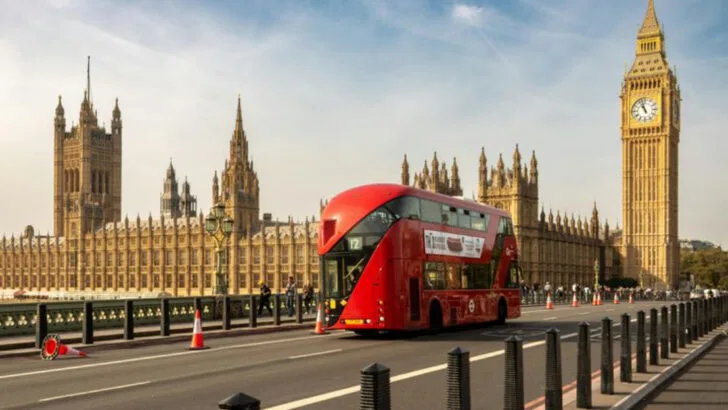Visiting England is an adventure filled with historic streets, quaint villages, and iconic landmarks, but knowing a few unwritten rules can make your trip smoother. From etiquette in pubs to navigating public transport, these customs help travelers blend in and enjoy the local culture.
Understanding these guidelines can transform a good visit into a great one, making interactions more pleasant and travel more enjoyable. With small gestures, respectful habits, and insider knowledge, England proves that a little local insight goes a long way.
Stand on the right on escalators
London’s bustling Underground is an epitome of organized chaos. As you step onto the moving staircase, a silent agreement prevails: stand on the right, walk on the left. This rule, as unofficial as it is, ensures a smooth flow for those in a hurry. Ignore it and you might find yourself on the receiving end of a polite yet firm reminder. This custom extends beyond the Underground, reflecting a broader cultural respect for personal space and efficiency. So, next time you’re on an escalator, remember this simple yet crucial rule.
Queue patiently—no cutting in line
In England, queuing is almost a national pastime, a reflection of patience and orderliness. Cutting in line is not just frowned upon; it’s a breach of social contract. This tradition is deeply ingrained, spanning from bustling city streets to serene countryside fairs. Even in a rush, it’s best to join the line and wait your turn. The English queue with a quiet determination, seeing it as a test of character. Whether at a supermarket or a bus stop, embracing the queue is embracing a piece of English culture.
Mind your volume in public transport
Public transport in England often resembles a tranquil sanctuary. Here, conversations are kept to a minimum, and loud chatter is considered intrusive. Many commuters relish this time to read, think, or simply unwind. Imagine a library on wheels, where silence is golden. Respecting this unspoken rule demonstrates consideration for fellow travelers. If you must speak, doing so in hushed tones is appreciated. This practice not only ensures a peaceful journey but also reflects the English penchant for personal privacy and respect.
Order at the bar in pubs, not at your table
Pubs are a quintessential part of English culture, each with its own charm and character. Unlike restaurants, table service is not the norm. Instead, patrons engage in the age-old tradition of ordering at the bar. This practice stems from the pub’s history as a communal hub, where interactions thrive over the counter. It’s an opportunity to chat, maybe even make a new friend. By joining the queue at the bar, you’re partaking in a tradition that values community and conversation over mere convenience.
Use “please” and “thank you” liberally
Politeness is an art form in England, where ‘please’ and ‘thank you’ pepper everyday interactions. These words are more than mere courtesies; they’re a way of life. From ordering a cup of tea to requesting directions, the liberal use of these expressions cannot be overstated. This habit underscores a deep-seated respect for others and smooths the social wheels. A simple ‘thank you’ can bridge gaps and build rapport, even in the briefest encounters. Remember, in England, kindness and consideration go a long way.
Keep to the left when walking on sidewalks
Walking on English sidewalks is akin to navigating a gentle river flow. Keeping to the left allows for a seamless passage, reminiscent of the country’s left-side driving custom. This unwritten rule aids in maintaining order even during the busiest of rush hours. It’s a subtle dance of courtesy, ensuring everyone moves along without disruption. Failing to adhere might not result in a collision, but it could cause a ripple of confusion. This simple act of alignment reflects a broader societal appreciation for order and respect.
Tip modestly, usually 10–15% in restaurants
Tipping in England is more understated than in some countries. A 10–15% gratuity is generally appreciated but not always expected. Often, a service charge is already included in the bill, so checking before you tip is wise. This practice reflects a culture that values fair wages for service staff. While tipping is a way to express satisfaction, overly generous tips might be seen as excessive. In cafes and smaller eateries, leaving a bit of change is customary. Modesty in tipping aligns with the English appreciation for subtlety and balance.
Don’t expect free refills on drinks
In England, free refills are a rarity. Each cup or glass is typically a stand-alone purchase, reflecting a culture that values quality over quantity. This might come as a surprise to those accustomed to bottomless beverages. However, it offers an opportunity to savor each drink, be it tea, coffee, or something stronger. This practice is rooted in a tradition of enjoying life’s smaller pleasures. As you sip your beverage, embrace this aspect of English hospitality, which emphasizes appreciation over abundance.
Respect historical sites and private property
England’s historical sites are treasures that speak of times long past. Visitors are expected to treat these places with the reverence they deserve. This means staying on designated paths, not touching artifacts, and leaving no trace behind. Similarly, private property is respected with an unspoken understanding. This respect extends to the countryside, where public footpaths cross private lands. By honoring these spaces, you contribute to preserving England’s rich history and landscape. Being mindful of rules and signs ensures these areas remain pristine for future generations.
Follow posted signs in gardens and museums
Gardens and museums in England are curated experiences, each sign carefully placed to enhance the visitor’s understanding and enjoyment. These signs are not mere suggestions but guides that ensure the safety and preservation of exhibits and flora. Following them shows respect for the curators and gardeners who dedicate their time to maintaining these spaces. This rule is particularly important in places where interaction could lead to damage. Observing signage is part of the broader English ethos of respecting shared spaces and cultural heritage.
Be punctual for tours and appointments
Punctuality is a sign of respect and responsibility in England. Being on time for tours and appointments signals that you value others’ time as much as your own. This is particularly true in professional settings and guided tours, where schedules are meticulously planned. Arriving late can disrupt the flow and cause inconvenience. The English view time as a shared resource, to be respected and used wisely. By being punctual, you engage with this cultural norm, ensuring smoother interactions and experiences throughout your visit.
Ask before taking photos of people
In an age where capturing moments is second nature, taking photos of people in England requires a personal touch. It’s considered courteous to ask permission before snapping someone’s photo, respecting their privacy and personal space. This is especially true in less touristy areas where locals may be less accustomed to cameras. A simple request often results in a friendly exchange, and you may even gain insights into local life. This practice reflects a broader cultural appreciation for privacy and respect, extending beyond just photography.
Use polite greetings when entering shops or small stores
Entering a small shop or boutique in England isn’t just a transaction; it’s a social interaction. A polite greeting upon entering sets a positive tone and acknowledges the shopkeeper’s presence. This small gesture goes a long way in building rapport and creating a welcoming atmosphere. Whether it’s a cheery ‘Good morning’ or a simple ‘Hello’, these greetings are the fabric of everyday interactions. These exchanges reflect a culture that values civility and connection, emphasizing the importance of each individual’s role within the community.

